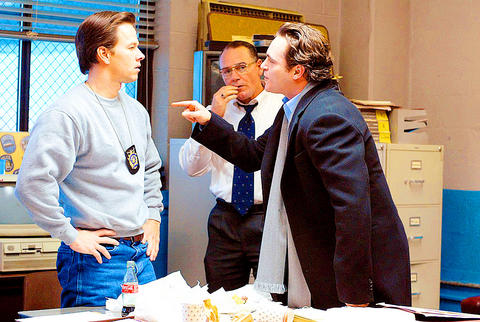On a show like The Wire, policemen and criminals belong to competitive organizations locked in uneasy, permanent coexistence. In We Own the Night, James Gray's operatic new film, the police and drug dealers are imagined as warring tribes in a fight to the death. The Russian gangsters on one side appear ready to take out the entire NYPD. And some of the cops are just as eager to forgo the legal niceties and do some righteous killing of their own.
In other words, We Own the Night is not a procedural, in which the narrative is threaded through details of the job and close observations of big-city life. It is, rather, a bloody, passionate melodrama, self-consciously Shakespearean - or Biblical, or Greek, take your pick of atavisms - in its intentions.
At the enter are two brothers: Joseph Grusinsky (Mark Wahlberg), a clean-cut, ambitious family man rising quickly through the ranks of the department, and Bobby Green (Joaquin Phoenix), who has forsaken the family surname and who manages a raucous nightclub in Brooklyn.

PHOTO: COURTESY OF CMC
Cain and Abel; the ant and the grasshopper. Bobby and Joseph present, at least at first, wildly contrasting temperaments as well as divergent career choices. Joseph takes after their father, Burt (Robert Duvall), a high-ranking officer who can barely contain his disappointment and disgust when Bobby is in the room. But Bobby, while he may be as irresponsible as his father and brother think he is, also has a sweet, impulsive, hedonistic side. He shows it in an early scene of sexual bliss with his girlfriend, Amada (Eva Mendes), and in the way he bounces through his cavernous club and into the apartment of its owner, a grandfatherly Russian named Buzhayev. Bobby is loving, and also lovable.
But he is also a traitor. Much as he may revel in the company of his surrogate family, the claims of blood are stronger. When Buzhayev's gangster nephew Vadim (Alex Veadov) causes Joseph to be hurt, Bobby puts away his childish sense of fun and gets down to the grim business of settling scores.
As this happens, the life begins to leak out of We Own the Night, and out of Phoenix's performance.
There is nothing especially interesting or new in the film. We Own the Night is set in 1988, a wilder and more dangerous time in the city's history. But in spite of a few historically apt musical selections and a digitally enhanced cameo appearance by former mayor Ed Koch, this is less a period movie than an exercise in free-floating nostalgia.
It's not nostalgia for any particular time or place, but rather for a mythical, tribal America where the obligations of clan trump individual desires. An index of Bobby's betrayal is that he has adopted his mother's maiden name, and his attempt to escape into a life of easy pleasure, social mobility and self-invention is doomed from the start. Where he ends up is where he always belonged.

June 23 to June 29 After capturing the walled city of Hsinchu on June 22, 1895, the Japanese hoped to quickly push south and seize control of Taiwan’s entire west coast — but their advance was stalled for more than a month. Not only did local Hakka fighters continue to cause them headaches, resistance forces even attempted to retake the city three times. “We had planned to occupy Anping (Tainan) and Takao (Kaohsiung) as soon as possible, but ever since we took Hsinchu, nearby bandits proclaiming to be ‘righteous people’ (義民) have been destroying train tracks and electrical cables, and gathering in villages

Dr. Y. Tony Yang, Associate Dean of Health Policy and Population Science at George Washington University, argued last week in a piece for the Taipei Times about former president Ma Ying-jeou (馬英九) leading a student delegation to the People’s Republic of China (PRC) that, “The real question is not whether Ma’s visit helps or hurts Taiwan — it is why Taiwan lacks a sophisticated, multi-track approach to one of the most complex geopolitical relationships in the world” (“Ma’s Visit, DPP’s Blind Spot,” June 18, page 8). Yang contends that the Democratic Progressive Party (DPP) has a blind spot: “By treating any

This year will go down in the history books. Taiwan faces enormous turmoil and uncertainty in the coming months. Which political parties are in a good position to handle big changes? All of the main parties are beset with challenges. Taking stock, this column examined the Taiwan People’s Party (TPP) (“Huang Kuo-chang’s choking the life out of the TPP,” May 28, page 12), the Democratic Progressive Party (DPP) (“Challenges amid choppy waters for the DPP,” June 14, page 12) and the Chinese Nationalist Party (KMT) (“KMT struggles to seize opportunities as ‘interesting times’ loom,” June 20, page 11). Times like these can

Swooping low over the banks of a Nile River tributary, an aid flight run by retired American military officers released a stream of food-stuffed sacks over a town emptied by fighting in South Sudan, a country wracked by conflict. Last week’s air drop was the latest in a controversial development — private contracting firms led by former US intelligence officers and military veterans delivering aid to some of the world’s deadliest conflict zones, in operations organized with governments that are combatants in the conflicts. The moves are roiling the global aid community, which warns of a more militarized, politicized and profit-seeking trend